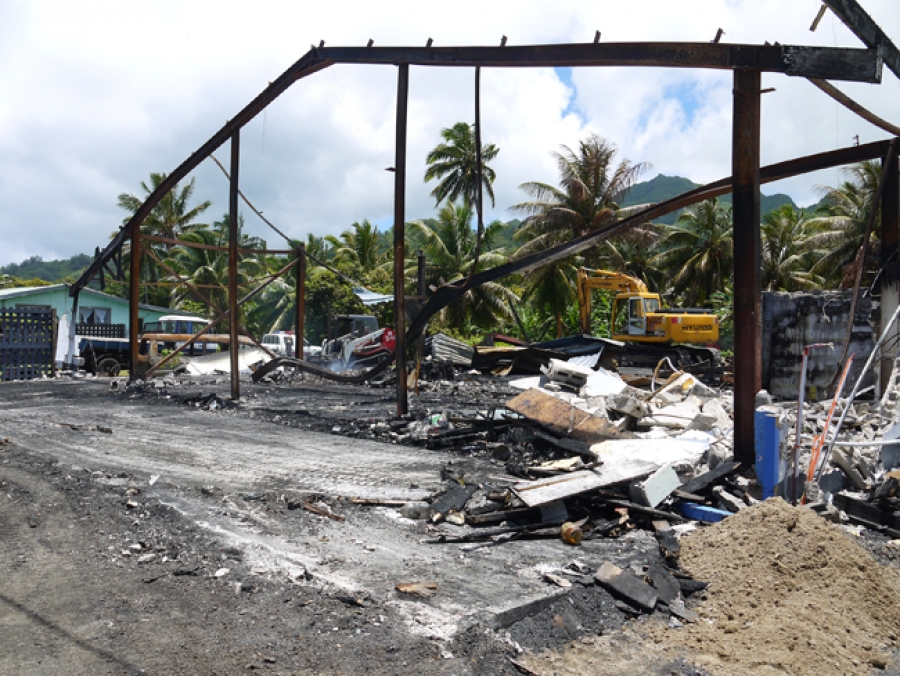
Three sepearate arson attacks were investigated in January. The fires destroyed a number of buildings on Rarotonga.
January Consultations over Te Mato Vai, Rarotonga’s $62 million water mains project, began in earnest.
MP Teina Bishop’s future was under discussion as he faced allegation of bribery and misconduct during his time as Minister of Marine Resources.
Three suspected arson attacks were investigated on the island. Targets included Nukutere College and Avatea School, both severely damaged by fires in late 2013.
February
International mobile phone network provider Digicel began eyeing up Telecom’s 40 per cent share in Telecom Cook Islands.
On the health front, there were two confirmed cases of dengue fever on Rarotonga. Meanwhile, Grey Power members were giving up hope of getting refunds for tax on their pensions.
March
George Pitt was sacked as chairman of the Business Trade Investment Board.
Mosquitoes became a problem, with nearly 130 Rarotonga residents affected by a zike-like virus. Like dengue fever, there was no antidote.
April
Parliament was dissolved and an election date was set for July.
Any locals willing and able to pay $23 million for the lion’s share of Telecom Cook Islands were given their chance to make an offer for the business.
Political shenanigans continued, with Aitutaki Member of Parliament Teina Bishop resigning from Cabinet after an apparent falling out with Prime Minister Henry Puna.
May
The first round of candidates for the upstart One Cook Islands ‘political movement’ was announced.
A fire at the popular Vaima restaurant in Vaimaanga reduced the building to a heaped pile of twisted metal and scorched timber.
People attempting to import ‘legal highs’ into the Cook Islands were warned they could face criminal prosecution as the Ministry of Health announced a crackdown on legal highs, party pills and other ‘social’ drugs.
June
Outer island residents in Palmerston went to the polls to cast their votes in advance of July’s General Elections.
Meanwhile, officials sought help from local contractors to help carry out an $18 million project aimed at improving household sanitation systems in Rarotonga and Aitutaki.
July
Decision Day 2014 arrived and 10,540 voters went to the polls. An estimated 10,540 voters were registered to exercise their democratic right by voting in the General Elections.
A total of 52 candidates ran in the country’s 24 constituencies, representing the Cook Islands Party, the Democratic Party, One Cook Islands and two independents. Results for all constituencies were finalised after a week of recounts, resulting in the Cook Islands Party winning a slim majority with 13 seats. But that was by no means the end of election news – there was much more to come.
August
Dates were set by the Cook Islands High Court to hear petitions filed in the aftermath of the previous month’s general elections.
Construction of a massive solar energy system at Rarotonga Airport took a major step forward when a start was made on installing 3000 solar panels to harness free power from the sun.
An incident involving illegal fishing by an unlicensed foreign purse seine vessel was settled out of court, but officials refused to reveal the settlement amount.
September
Prime Minister Henry Puna advised Head of State Tom Marsters to summon Parliament.
Contractors announced they had completed one tenth of Te Mato Vai, Rarotonga’s ambitious water mains project.
October
A law change to return seized money from the bank accounts of pensioners was tabled and dealt with. The money had been seized before the previous Christmas without the prior knowledge of the Prime Minister and Cabinet. Finance Minister Mark Brown said a backtax provision exempted the seniors from paying tax on all pension earnings earned until the end of 2012. However pensioners were liable to pay tax from 2013 onwards.
After months of delay due to July’s snap elections, a budget containing details of government spending for the remainder of the financial year was tabled in Parliament.
November
Government must have been relieved when the 2014/2015 budget was passed with full support from members of both the Cook Islands Party and One Cook Islands Party.
‘Three strikes and they’re out’. That was the message from the Cook Islands Party when their electoral petition over the Mitiaro seat was upheld against a petition by the Democratic Party in the Court of Appeal.
December
With the completion of a much-anticipated project, Rakahanga made Cook Islands history by becoming the first island in the nation to become almost 100 per cent solar powered. Its electricity system is powered by renewable energy thanks to a project funded by New Zealand under the EU/NZ Energy Access Partnership.
Christmas came early for the Democratic Party when they secured the Mitiaro seat. Party leaders made it known that they might be able to form a Government if they could secure the support of the One Cook Islands Party.
And just when everyone thought it all the election fuss was finally over, it turned out that the future of the Cook Islands Government now rests on the outcome of a by-election in Aitutaki.
Following the petition decisions the Democratic Party became even more confident it could form a Government to oust the Cook Islands Party.




















































